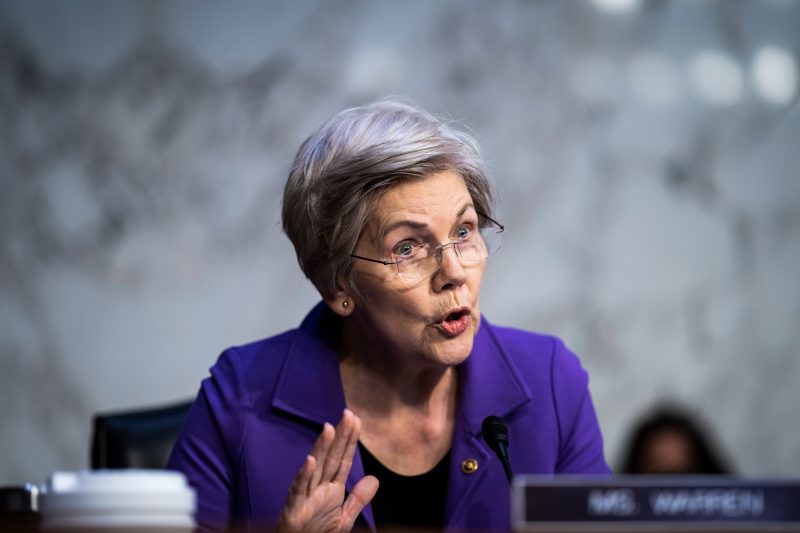Sen. Elizabeth Warren (D-Mass.) on Sunday called on Congress to lift the federal insurance levels for bank deposits above $250,000, a week after the Biden administration announced it would protect all depositors at Silicon Valley Bank, regardless of how much money they had in the failing institution.
Currently, the Federal Deposit Insurance Corporation, or FDIC, insures only up to $250,000 in deposits at banks. On CBS’s “Face the Nation,” Warren, a member of the Senate Banking Committee and a commercial and bankruptcy law expert, suggested raising that figure to anywhere from $2 million to $10 million.
“Small businesses need to be able to count on getting their money to make payroll, to pay the utility bills,” she said. “Nonprofits need to be able to do that. These are not folks who can investigate the safety and soundness of their individual banks. That’s the job the regulators are supposed to do.”
Warren, who was among a faction of Democrats who vocally opposed a 2018 law that rolled back key provisions of the 2010 Dodd-Frank Act and weakened bank regulations, said that lifting the FDIC insurance cap would be “a good move” if done in conjunction with tighter regulations on banks.
In another appearance, on ABC’s “This Week,” Warren got more specific, saying she wants Congress to repeal a provision of the 2018 law that had loosened restrictions on banks with $50 billion or more in assets.
“Those are the banks for whom the principal regulator is the Federal Reserve Bank. And those are the banks that took on these risky practices that ultimately have … blown up at least three banks,” Warren said. “We need tough regulation. If you’ve got more than $50 billion … you ought to be subjected to stress tests and decent capital requirements and so on.”
A longtime critic of Federal Reserve Chair Jerome H. Powell, Warren also said he should ensure that the Fed pause its campaign to raise interest rates, citing factors such as the war in Ukraine and price gouging. The Fed’s next policy meeting is this Tuesday and Wednesday, with the rate announcement due Wednesday afternoon.
“Raising interest rates doesn’t do anything to solve those problems. All it does … is put millions of people out of work,” Warren said.
She stopped short of explicitly saying she had advised President Biden to remove Powell as chair of the Fed but said he should no longer be in that position.
“Look, my views on Jay Powell are well known at this point,” she added. “He has had two jobs. One is to deal with monetary policy. One is to deal with regulation. He has failed at both.”
Other lawmakers are also weighing in. On “Face the Nation,” Rep. Patrick T. McHenry (R-N.C.), chairman of the House Financial Services Committee, said that even though Warren’s interview was the first time he had heard of a proposal to lift the deposit insurance cap, he did not rule out the possibility. McHenry noted that the FDIC had raised its deposit insurance cap from $100,000 to $250,000 in 2010, after the last financial crisis.
“I have not had a single conversation with the White House or the administration about [changing the level on] deposit insurance,” McHenry said. “What I will do, though … is determine whether or not we need to address the FDIC deposit level.”
On NBC’s “Meet the Press,” Sen. Mike Rounds (R-S.D.), a member of the Senate Banking Committee, suggested that the $250,000 deposit cap was not high enough, citing inflation.
“When we talk about allowing a bank to fail, it’s one thing to say it’s okay to allow the owners of a bank to lose their resources. It’s another thing to say that the depositors should necessarily be allowed to lose their deposits,” Rounds said. “That’s the reason why we begin with a quarter of a million dollars in protection. Perhaps that’s not enough.”
Warren’s proposal comes a week after federal authorities announced they would protect all deposits at two failing banks — Silicon Valley Bank and Signature Bank of New York — to stabilize and bolster public confidence in the U.S. banking system. But the banks’ collapse has also renewed fights over federal banking regulations.
On Friday, Biden called on Congress to impose tougher penalties on senior bank executives whose mismanagement contributes to the failure of their institutions, saying current law limits his administration’s authority to hold bank executives responsible when their institutions fail and are put into receivership under the FDIC, as Silicon Valley Bank did about a week ago.
Biden asked Congress to expand the FDIC’s authority to impose stronger punishments on executives at such banks, including barring them from taking other jobs in the banking industry, issuing fines and reclaiming their compensation.
That compensation should include gains from stock sales, the White House specified later Friday, noting that Silicon Valley Bank chief executive Greg Becker sold $3.6 million in company stock days before the bank’s collapse.
Under existing law, the FDIC can only fine bank executives who “recklessly” engage in a pattern of “unsafe or unsound” practices. The federal agency also can prevent executives from holding jobs at other banks only if they demonstrate “willful or continuing disregard for the safety and soundness” of their bank.
“Congress should strengthen this tool by lowering the legal standard for imposing this prohibition when a bank is put into FDIC receivership,” the White House said Friday. “The President believes that if you’re responsible for the failure of one bank, you shouldn’t be able to just turn around and lead another.”
Azi Paybarah contributed to this report.

